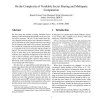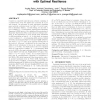588 search results - page 21 / 118 » Reducibility and Completeness in Private Computations |
SODA
2008
ACM
13 years 9 months ago
2008
ACM
A common approach for dealing with large data sets is to stream over the input in one pass, and perform computations using sublinear resources. For truly massive data sets, howeve...
CRYPTO
2007
Springer
14 years 1 months ago
2007
Springer
Abstract. We study the natural problem of secure n-party computation (in the passive, computationally unbounded attack model) of the n-product function fG(x1, . . . , xn) = x1 · x...
STOC
2000
ACM
13 years 11 months ago
2000
ACM
We first study the problem of doing Verifiable Secret Sharing (VSS) information theoretically secure for a general access structure. We do it in the model where private channels b...
TON
2008
13 years 7 months ago
2008
Most network operators have considered reducing LSR label spaces (number of labels used) as a way of simplifying management of underlaying Virtual Private Networks (VPNs) and there...
PODC
2009
ACM
14 years 8 months ago
2009
ACM
Consider a completely asynchronous network consisting of n parties where every two parties are connected by a private channel. An adversary At with unbounded computing power activ...




